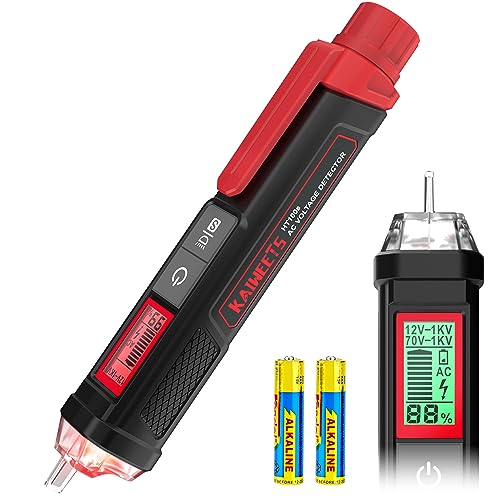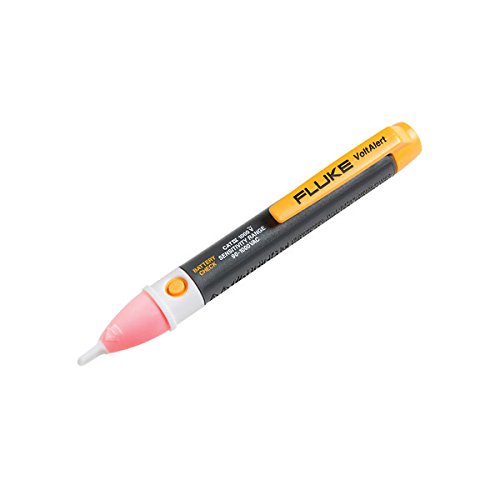The accuracy of voltage detectors varies, usually falling within a range of 90% to 99%. Factors like device quality, environmental conditions, and battery level can influence precision.
Voltage detectors are essential tools for electricians and DIY enthusiasts alike, tasked with ensuring safety when working with electrical systems. These handheld devices quickly identify the presence of electrical voltage in outlets, switches, circuit breakers, and cables. The ease of use and practicality make voltage detectors a go-to for quick checks before proceeding with electrical work.
It’s important to note that while voltage detectors are highly reliable, they should not be the sole method for verifying the absence of voltage. Professional tradespeople often combine their use with other testing methods to confirm a zero-energy state in compliance with safety standards. Calibration, regular testing, and proper maintenance contribute to the accuracy of voltage detectors, making them a valuable addition to any tool kit.

Introducing Voltage Detectors
Voltage detectors are essential tools in the world of electrical safety. They are designed to detect the presence of electricity in wires, devices, and even in the air. Professionals use these tools to ensure that they can work safely by confirming that circuits are not live.
The Basic Functionality
- Voltage detectors sense electric charges.
- They indicate live current without direct contact.
- LED lights or sounds alert to voltage presence.
- Some models require physical contact with a conductor.
- Non-contact models detect voltage through insulation.
Common Uses In Electrical Work
| Task | Use of Voltage Detector |
|---|---|
| Checking Breakers | Identifies active circuits |
| Finding Wire Breaks | Pinpoint exact break locations |
| Testing Light Fixtures | Confirms power status before repair |
| Installing New Wiring | Ensures lines are de-energized |
| Maintenance Checks | Verifies proper operation of equipment |
Types Of Voltage Detectors
Knowing the right tool to test for voltage is key to any electrical task. How accurately a voltage detector works depends on its type. Here, explore the promising options available in the market.
Non-contact Voltage Testers
A Non-Contact Voltage Tester senses voltage without touching wires. It beeps or flashes when electricity is present. Perfect for quick checks, they provide safety with no direct contact required.
- Safe and easy to use
- Ideal for preliminary testing
- Visual and audio alerts
Inductive Probes
Inductive Probes are more precise. They pick up magnetic fields from AC voltages. These tools often partner with tone generators to trace wires. Find hidden wires with ease using inductive probes.
- Trace wires in walls
- Detects AC voltage presence
- Works with tone generators
Voltmeters And Multimeters
Voltmeters and Multimeters stand out for accuracy. They read voltage levels, not just presence. Multimeters include functions like current and resistance measurement. They are the go-to for detailed diagnostics.
| Tool | Functions | Use Case |
|---|---|---|
| Voltmeter | Measures voltage only | Simple voltage checks |
| Multimeter | Measures voltage, current, resistance | Comprehensive diagnostics |
Accuracy Factors
Knowing the accuracy of a voltage detector is vital. This accuracy is not always the same. It changes with different factors. We will explore factors like device calibration, brand quality, and the environment. These factors can change how your voltage detector works.
Device Calibration
Regular calibration is key to a voltage detector’s accuracy. Calibration aligns the device with precise standards. Without calibration, readings might not be true. This process should happen often. Check the user manual to know how often this needs to be done. Following proper calibration guidelines is a must for reliable readings.
Quality And Brand Variations
Different brands and qualities impact accuracy. Higher-quality tools often have better precision. Cheaper models might not be as reliable. To find a good voltage detector, look for brands with a strong reputation. Trusted brands are more likely to offer tools that give correct readings.
Environmental Influence On Performance
Your environment can affect a voltage detector’s accuracy. Factors include:
- Temperature: Extreme cold or heat can mess with performance.
- Humidity: High moisture levels might cause incorrect readings.
- Electrical Interference: Nearby devices could lead to false alerts.
Understanding these factors makes finding the right tool easier. It helps ensure your safety and the reliability of your electrical work.

Credit: www.nature.com
Common Myths Surrounding Voltage Detectors
When working with electricity, safety is paramount, and voltage detectors are essential tools for electricians and DIY enthusiasts alike. Yet, common misconceptions about these devices persist. Let’s debunk these myths to ensure safety and precision in electrical work.
Myth: All Voltage Detectors Are Created Equal
Not all voltage detectors perform the same way. Different models offer various features, sensitivities, and ranges. Some might be suitable for low-voltage applications, while others excel in high-voltage environments. Choosing the right detector depends on the specific job at hand.
Myth: Voltage Detectors Are Always 100% Accurate
Assuming a voltage detector is infallible is a mistake. Factors like battery life, device quality, and user error can impact accuracy. Regular calibration and proper usage are key to maintaining the reliability of these tools.
Myth: Non-contact Detectors Are Foolproof
Non-contact voltage detectors are convenient but not without limits. Obstructions, environmental conditions, and interference may lead to false readings. Users must understand these limitations and sometimes complement their readings with other methods for assurance.
| Myth | Fact |
|---|---|
| All voltage detectors are the same. | Variety exists in functionality and application. |
| Detectors are always accurate. | Accuracy varies; maintenance and correct operation are crucial. |
| Non-contact detectors are flawless. | Use them with an understanding of their potential limitations. |
- Check the batteries of detectors regularly.
- Read the manufacturer’s instructions thoroughly.
- Test on a known live circuit when possible.
Remember, the right knowledge dispels myths and promotes safe and competent electrical maintenance. Choose wisely, use correctly, and maintain your voltage detectors for the best performance.
Proper Use And Limitations
Voltage detectors are handy for checking the presence of electricity in wires and devices. Correct usage and an understanding of their limitations ensure safety and accuracy. Let’s explore how sensitivity settings, user skills, and potential false readings affect the performance of these essential tools.
Understanding Sensitivity Settings
Sensitivity settings on voltage detectors are pivotal for accurate detection. High sensitivity can detect minimal voltage presence, while lower settings might require stronger signals. Users must adjust settings based on the environment and the electrical components in question, to avoid missing live currents or getting unnecessary alerts.
- High Sensitivity: Detects low-voltage or distant sources.
- Low Sensitivity: Reduces non-essential alerts from neighboring wires.
Recognizing False Positives And Negatives
False positives may occur when a detector picks up static electricity or adjacent live wires. Conversely, false negatives may dangerously suggest no voltage present when there actually is. It’s crucial to understand these possibilities and double-check readings.
| Cause | False Positive | False Negative |
|---|---|---|
| Static Electricity | Yes | No |
| Interference | Yes | No |
| Low Battery | No | Yes |
Importance Of User Skill Level
The skill level of the person using the voltage detector can greatly influence its accuracy. Experienced users are likely to get more reliable results due to their familiarity with the tool’s nuances and their ability to interpret readings correctly. Novices must take time to learn and practice in safe environments.
- Read the manual thoroughly.
- Practice on known live and dead circuits.
- Understand the tool’s feedback (lights, sounds).

Credit: fastercapital.com
Safety Concerns And Misconceptions
Understanding the accuracy of voltage detectors involves more than just technical specs. Safety procedures and common myths play crucial roles in the effective use of these tools. This section explores the real-world concerns tied to voltage detector usage.
The Role Of Voltage Detectors In Safety
Voltage detectors serve as the first line of defense against electrical hazards. These devices indicate the presence or absence of voltage in equipment, wires, or outlets. Correct usage ensures workers engage safely with electrical systems.
- Prevents contact with live wires
- Reduces risk of electric shock
- Essential for safe maintenance work
Misconceptions That Can Lead To Hazards
Misunderstandings about voltage detectors can create false confidence. Let’s debunk popular myths.
| Misconception | Reality Check |
|---|---|
| Detectors work flawlessly. | Even high-quality models may fail. Regular testing is crucial. |
| No beeping means no voltage. | False negatives occur. Double-check with multiple methods. |
| Voltage detectors are foolproof. | User error and device limitations demand cautious handling. |
Each device has its own sensitivity range. It is vital to understand device specifications and limitations to avoid accidents.
Testing And Verification Strategies
Many rely on voltage detectors for safety and accuracy in their electrical work. To ensure reliability, testing and verification strategies are crucial. It’s vital to confirm the tool’s precision through robust testing methods. Let’s explore some essential strategies.
Comparative Testing With Other Instruments
One effective way to measure a voltage detector’s accuracy is by comparing its readings with other proven instruments, such as multimeters. In comparative testing:
- Align the instruments’ measurements with known voltage sources.
- Record findings from each device.
- Analyze discrepancies to assess the voltage detector’s performance.
Consistent alignment with the reference tool indicates high accuracy. On the contrary, noticeable differences could signal an issue.
Regular Maintenance And Testing Procedures
Adherence to a regular maintenance schedule is vital to ensure the ongoing accuracy of a voltage detector.
- Check the device before each use for physical damage.
- Perform self-test functions, if available.
- Replace batteries regularly to maintain peak performance.
- Store the detector properly when not in use.
Regular testing and maintenance fortify the detector’s reliability. It ensures swift detection and prevents workplace hazards.
| Procedure | Frequency |
|---|---|
| Visual Inspection | Before every use |
| Battery Replacement | As per manufacturer guidelines or upon performance drop |
| Verification against known sources | Monthly or as needed |
| Professional Calibration | Annually or as per industry standards |
Systematic testing and verification bolster confidence in your detector’s readings. As with all instruments used in critical tasks, accuracy is non-negotiable for safety and efficiency. Implementing these strategies will keep the voltage detector trustworthy.
Choosing The Right Voltage Detector
Voltage detectors are crucial for electricians and DIY enthusiasts alike. They ensure safety when working with electrical circuits. Accuracy is key for these tools. It influences the detector’s reliability. Yet, choosing one can feel overwhelming. Let’s break down what to look for.
Key Features For Specific Applications
Different tasks require unique detector features. Here are essential ones to consider:
- Sensitivity Levels: Some detectors alert for low voltage ranges, others for high voltage. Choose based on your electrical tasks.
- Adjustable Settings: Get a detector with tunable sensitivity. It helps for precision tasks.
- Non-Contact vs. Contact: Non-contact detectors are safer. They identify live wires without touching them.
- Indicator Types: Audio and visual alerts improve efficiency and safety. Look for models with clear signals.
- Durability: Your detector should withstand various environments. Rugged, water-resistant designs are best.
Tips For Purchasing The Ideal Detector
Here’s a handy guide for buying your perfect voltage detector.
- Read Reviews: User experiences tell you about performance and reliability.
- Compare Brands: Not all detectors are equal. Research top brands for quality assurance.
- Check Certifications: Safety standards like CE and UL are signs of a trustworthy product.
- Warranty Matters: A solid warranty can save future costs. It’s a sign of the manufacturer’s confidence.
- Test Before Use: Always test on a known live circuit. Ensure your detector works as expected.
The Future Of Voltage Detection Technology
Exploring the accuracy of voltage detectors matters for safety and efficiency. Advanced technologies are enhancing these tools. Let’s peek into what the future holds for voltage detection technology.
Emerging Innovations
The world of voltage detection is seeing breakthroughs that make staying safe easier than ever. Cutting-edge designs provide clearer results and user-friendly experiences.
- Non-contact sensors ensure users stay at a safe distance.
- Visual indicators, like LED lights, show voltage presence boldly.
- Integrated self-testing features verify tool accuracy before each use.
How Tech Advancements Will Improve Accuracy
The accuracy of voltage detectors is set to soar. Technical leaps will diminish human error. This promises safer environments for professionals and hobbyists alike.
| Technology | Impact on Accuracy |
|---|---|
| AI Algorithms | Predicts irregularities for proactive maintenance. |
| Smart Calibration | Auto-adjusts to environmental changes for precise readings. |
| IoT Connectivity | Feeds data to devices for real-time monitoring and alerts. |
Digital displays replace ambiguous readings with precise numbers. Smartphones sync with detectors for remote monitoring. This ensures expert oversight in challenging environments.
Frequently Asked Questions For How Accurate Is Voltage Detector?
How Do Voltage Detectors Work?
Voltage detectors function by sensing the electric field around objects that are energized. When they detect a voltage, they typically indicate it via a light or sound. They do this without needing to make direct contact with the conductor which ensures safety.
Are Non-contact Voltage Detectors Reliable?
Non-contact voltage detectors are generally reliable for detecting the presence of voltage. However, they may give false readings due to interference or low battery, so it’s always good to test them on a known live circuit first.
What Factors Affect Voltage Detector Accuracy?
Several factors can affect the accuracy of a voltage detector: the device’s sensitivity, battery condition, the proximity of other conductive materials, and external electrical noise. Always use according to manufacturer guidelines for best results.
Can Voltage Detectors Detect Low Voltage?
Some voltage detectors are designed to detect low voltage, but their sensitivity varies. Always check the specifications to ensure the detector meets your requirements for low-voltage applications.
Conclusion
Ensuring safety during electrical projects hinges on reliable tools. Voltage detectors play a critical role in this, offering both professionals and DIY enthusiasts the ability to gauge live circuits confidently. While not infallible, technological advancements have significantly boosted their accuracy.
Choose wisely, test regularly, and never compromise on quality for the sake of safety.

